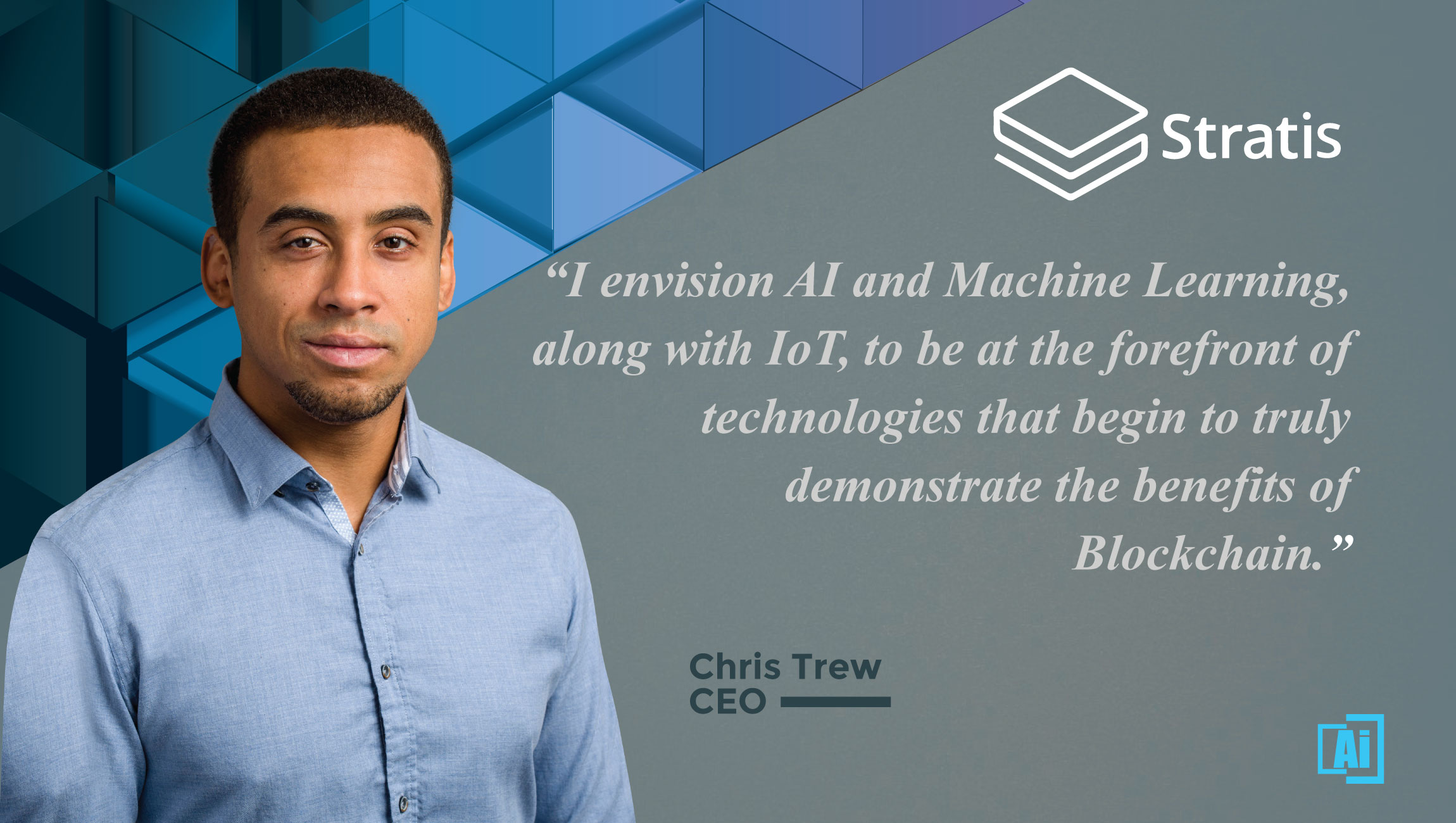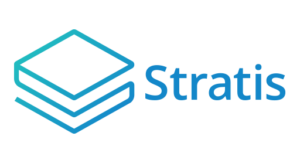AiThority Interview with Chris Trew, CEO at Stratis Group

Know Me
Tell us about your journey in technology and how you started at Stratis.
The common thread throughout my career is technology. Over the years, this has taken me from some of the top financial institutions such as Barclays as well as organizations in the legal, aviation and local government sectors. I’ve been fortunate that working for over a decade in enterprise IT has given me an excellent grounding in understanding the challenges that businesses face. This is what led me to recognize the value that could be unlocked by Blockchain technology.
I founded Stratis in 2016, with the intention of developing an enterprise-friendly Blockchain platform, something that I felt was missing in the space at that moment in time. This ultimately solidified our decision in building our Blockchain platform on the .NET Core. I also took the decision to base our architecture upon that of Bitcoin, this decision has paid dividends as time progressed.
I always foresaw Bitcoin being a dominant technology within the blockchain space, with a team of loyal and innovative minds further developing the Bitcoin codebase to improve wherever possible. Basing our platform architecture upon Bitcoin meant that it would be significantly easier for us to integrate any technological advancements made in Bitcoin, allowing us to bring that innovation into both our public and private blockchain offerings.
Following the launch of our STRAT token, the platform had to secure over USD 2 billion of market cap value, demonstrating its ability to meet the most stringent security requirements of enterprises.
You come from a diverse and solid background in leading diverse IT and Cloud projects. How does experience in your previous roles help to manage operations at Stratis?
My background working in enterprise IT has intersected with many of the sectors ripe for Blockchain-based innovation, such as Finance and Law. It means I am able to draw on this experience to build the applications they need, from self-executing smart contracts that are flexible and easy to use, to a Security Token Offering (STO) platform for companies to launch their own security tokens compliant with SEC regulations.
In particular, developing within the .NET Core framework has been a particular specialty of mine. At Stratis, we have been able to use this programming framework to build a platform in C#, making it easy for IT professionals to develop on it. It all comes down to making blockchain accessible by ensuring it is easy to use and therefore encourages enterprise adoption.
What are the major disruptions you foresee in the Blockchain industry, especially with the Enterprise IT market in mind?
The ingenuity of Blockchain is that it can improve business efficiencies in almost any industry – wherever transactions take place or some form of data is stored. However, as we grow enterprise adoption, it is important for innovators to focus on what is achievable right now.
One of the areas seeing a real uptake in interest is the supply chain. Here, companies are recognizing the tangible value of blockchain’s decentralized nature and investing accordingly. For businesses, the supply chain can be a sprawling network of suppliers and vendors that lacks traceability and transparency.
By keeping an immutable, real-time record of transactions on a distributed ledger, and using smart contracts to execute agreements, businesses can streamline the supply chain, making it more efficient and saving costs. There is a whole swathe of examples where companies of all sizes are already targeting blockchain applications, and this is sure to be a key growth area for the technology.
Read More: AiThority Interview with Ben Barokas, CEO and Co-founder at Sourcepoint
Who are your customers? What are the unique user-case scenarios that you solve for these customers?
We pride ourselves on the flexibility of our Blockchain platform and this is demonstrated by the varied industries our customers operate in. For example, UK-based MediConnect is building a solution on our platform to revolutionize the way medicine is managed and traced. It acts as a safety net for patients, prescribers, pharmacies and drug manufacturers by preventing patients ordering prescriptions with multiple online pharmacies; identifying counterfeit drugs and preventing their distribution into the supply chain; alerting patients instantly when a drug or medicine is recalled, and providing regulators with real-time monitoring to cut costs and risks. They recently completed an Initial Coin Offering (ICO) of their MEDI Token, based on our SRC-20 Standard Token, and are now building out their solution with our support.
Similarly, we are working with US-based Gluon, which is building out a secure network of interconnected vehicles, allowing users to diagnose, track and monitor issues using IoT devices, AI and Blockchain. They are currently in the process of registering with the US Securities and Exchange Commission (SEC) ahead of launching a security token on our new STO platform.
Tell us about your recent collaboration with Triad. How does it influence Blockchain adoption in an enterprise setup?
Triad is a leading UK provider of IT consultancy services with a thirty-year track record of working with businesses, government and third-sector organizations. They have been exploring how blockchain could help their clients for a few years now, originally building a blockchain-based courier parcel tracking application on the Ethereum platform. This demonstrated to them that sharing immutable data on a decentralized network could provide transparent, accurate and near real-time performance data across multiple couriers. However, they considered the technology too immature due to the complexities and inefficiencies of the self-executing smart contacts on this platform
Since our first meeting in June last year, we were able to set out how our “Blockchain-as-a-Service” offering included a fast, scalable platform with easy-to-use smart contracts, a full testing environment, and round-the-clock support. Crucially, this opens up blockchain to enterprise adoption since developers can program smart contracts on the Stratis platform in C# on Microsoft’s .NET Core framework – the most popular enterprise programming language on the most widely-used enterprise framework.
Triad has already ported its parcel tracking application to the Stratis platform and now we have signed a broader framework agreement to jointly deliver blockchain-based solutions to Triad’s clients on our platform, where appropriate. Ultimately, this will help accelerate enterprise adoption of blockchain as businesses seek to access the value that the technology can deliver.
China recently brought Crypto Law. What are your predictions on the future of Blockchain, Crypto laws, etc?
The Crypto Law is clear evidence that China wants to be on the front foot when it comes to the adoption of blockchain. The government has called for more research and investment into blockchain technology as it ramps up its plans to be the first country to launch a digital currency. But blockchain has endless possibilities for use cases that go beyond cryptocurrency and 2020 will be the year we start to see the technology mature and be adopted more widely.
The rest of the world will have to take note of China. The feeling is that China is leading the way in blockchain, however, a new cryptocurrency bill, the ‘Cryptocurrency Act 2020’, was recently put forward in the US to help government bodies oversee and regulate crypto transactions. If it becomes law, its impact could reshape the crypto landscape in the US.
Major governments are looking closely at cryptocurrencies and blockchain and how it can be best utilized. Increased laws and regulations will add legitimacy and credibility and help drive the widespread adoption of blockchain throughout the business.
Read More: AiThority Interview with Dejan Milojicic, Distinguished Technologist at Hewlett Packard Labs
How do you see AI and Machine learning capabilities further improving Blockchain adoption in Enterprise IT setup?
This is an interesting question and something I have a keen interest in. There are a number of technologies that pair very well with Blockchain technology, reaping the benefits that blockchain inherently brings. i.e. immutability, trustless-ness, and distributed data.
Of those technologies, I envision AI and Machine Learning, along with IoT, to be at the forefront of technologies that begin to truly demonstrate the benefits of blockchain. Using farming and agriculture as an example, it is easy for us to see how these technologies can bring major efficiencies and introduce what is known as ‘Smart Farming’.
What is your opinion on “Weaponization of Blockchain and Crypto techniques”? How do you promote your ideas in the modern Digital economy?
Blockchain is set to play a major role in the digital economy. What is vital in any future digital economy is to have reliable infrastructure, security, transparency, and efficiency – all facets that lend themselves to blockchain technology. A large amount of the activities carried out by intermediaries today will be based on blockchain infrastructure tomorrow.
At Stratis, we are constantly speaking with enterprises regarding the benefits of adopting this technology and we are seeing a huge amount of interest across all industries. One example is our recent partnership with Triad, where we are helping their clients adapt to the modern digital age by adopting blockchain technologies to improve performance, including better operational processes, enhanced security, and increased efficiencies.
The Crystal Gaze
What digital technology start-ups and labs are you keenly following?
I like to stay in touch with what large consortiums within the blockchain industry are striving to achieve and implement. Voltron, who recently rebranded as Contour is a powerful consortium consisting of significant financial institutions.
We are seeing organizations like Contour deploy blockchain solutions within trade finance and logistics, highlighting the efficiencies and cost reductions that are possible. This sets the path for blockchain adoption becoming more palatable and acceptable to those organizations still hesitant to begin implementing and adopting this disruptive technology.
What other emerging technologies within your industry are you interested in?
Although this is not a new technology so to speak, zero-knowledge proofs is something that interests me a lot. Tying zero-knowledge proofs with blockchain technology to increase levels of privacy, anonymity, and privatization of data, opening doors for further use-cases is something that really excites me.
Tag the one person in the industry whose answers to these questions you would love to read:
@satoshinakamoto
Read More: AiThority Interview with Ashkan Rajaee, CEO at TopDevz
Thank you, Chris! That was fun and hope to see you back on AiThority soon.
Chris Trew is the CEO and Founder of Stratis Platform. Chris is a consultant, architect and technologist with over 10 years’ experience in Enterprise IT. His background includes extensive experience in the financial sector, working for some of the top financial institutions as well as in the Legal, Aviation and Local government sectors. He is also a backend developer specializing in C# and
ASP.NET technologies.

Stratis is an enterprise blockchain technology company that offers businesses a full suite of platform, products and consultancy services to help them develop bespoke blockchain applications. The Stratis Platform comprises a hybrid of private and public blockchains programmed in C# on Microsoft’s .NET
Core framework. Stratis’ team of in-house developers works alongside enterprises to advise, design, test and implement blockchain solutions customised to meet the specific needs of businesses. Stratis is a certified Microsoft partner and also has its own token, STRAT, to transfer value on the Stratis Platform.

Comments are closed, but trackbacks and pingbacks are open.